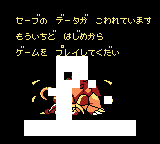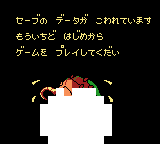Pokémon Diamond and Jade: Difference between revisions
| Line 18: | Line 18: | ||
==Translation== | ==Translation== | ||
[[Image:Somepointsof36lost.png|thumb|right|One of many examples of Engrish.]] | [[Image:Somepointsof36lost.png|thumb|right|One of many examples of Engrish.]] | ||
The translation has a reputation of being | The translation has a reputation of being filled with [[wikipedia:Engrish|Engrish]]; said Engrish is usually comprehensible. Nearly all the characters' and [[Denjuu]]'s names change in translation. | ||
For example, [[Shigeki]] becomes Bek. [[Crypto]] becomes Kuribute. [[T-Fanger]], a term for people who use Denjuu, becomes T-Mildew | For example, [[Shigeki]] becomes Bek. The names given to the Denjuu in these translations are based on either non-romanized versions of their original names, names of plants related to their original namesakes, pronunciations or even random nouns. [[Crypto]] becomes Kuribute (based on Kuriputo), [[Hagumanoki]] becomes Sumac (a plant related to the Denjuu’s namesake) and [[Easydog]] becomes Hat. [[T-Fanger]], a term for people who use Denjuu, becomes T-Mildew. Another notable characteristic of this translation is the presence of swear words. | ||
Evidence suggests that the game was translated | Evidence suggests that the game was translated from Japanese to Chinese first, and then from Chinese to English, retaining various errors originating from the Chinese translation.<ref>[http://s15.zetaboards.com/Tulunk_Village/topic/515438/1/?x=30 T1 Chinese bootleg - Tulunk Village]</ref> | ||
==Changes== | ==Changes== | ||
Revision as of 18:13, 28 March 2019
- Pokémon Diamond redirects here. For the Pokémon game by Game Freak, see Pokémon Diamond and Pearl on Wikipedia.
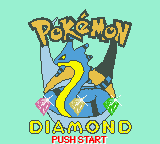
Pokémon Diamond and Jade are bootlegged versions of Keitai Denjuu Telefang 1. The Power Version was used to make Diamond, and the Speed Version became Jade. Along with a Chinese version, partly-translated German and Spanish versions also exist. Pokémon Jade has also been used for the name for an edited version of a pirated game called Sonic Adventures 7.
Boxarts
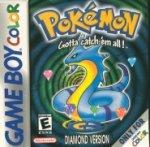
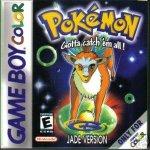
The monsters on the boxarts of both Pokémon Diamond and Jade depict a monster non-existent in the game, and seemed to be created entirely for the sake of a boxart. Pokémon Diamond features a blue snake creature with an unknown origin, while Jade has an altered version of the forest spirit Shishigami, from the film Princess Mononoke. The backs of most boxes are closely copied from the legitimate Pokémon Gold and Silver versions, with screenshots having been edited to include the fake mascot monsters, sometimes with monsters from other series such as Dragon Quest also included in the box design. There are many different variations of these boxes for different copies of the game, though this is typical of pirated games.[1]
Cartridges
For both Pokémon Diamond and Pokémon Jade, the cartridges are unlike legitimate Game Boy cartridges, and like the boxes, different variations of these cartridges exist.[1] [2] Most of the art on the cartridges are taken from the boxes of their respective games. Also, one type of Diamond cartridge has a nonstandard white casing, and Jade has a nonstandard green translucent casing. There are other Jade cartridges with black casings, just like other Game Boy Color games that are compatible with the original Game Boy. Also, like other bootleg cartridges, some of these cartridges say either "GAME", "GAME COLOR" or nothing at all on the top instead of the usual "Nintendo GAME BOY™" that is on authentic cartridges. They might also use a different, simpler type of screw on the back than those found on authentic cartridges.
Sometimes, either Diamond or Jade is bundled with a pirated Pokémon Crystal, which, like Diamond and Jade, is unofficially and poorly translated from the Japanese version (most likely before Crystal was released outside of Japan), and has glitches not present in the original version. Also, some cartridges have both Diamond and Jade in one.
Translation
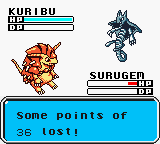
The translation has a reputation of being filled with Engrish; said Engrish is usually comprehensible. Nearly all the characters' and Denjuu's names change in translation.
For example, Shigeki becomes Bek. The names given to the Denjuu in these translations are based on either non-romanized versions of their original names, names of plants related to their original namesakes, pronunciations or even random nouns. Crypto becomes Kuribute (based on Kuriputo), Hagumanoki becomes Sumac (a plant related to the Denjuu’s namesake) and Easydog becomes Hat. T-Fanger, a term for people who use Denjuu, becomes T-Mildew. Another notable characteristic of this translation is the presence of swear words.
Evidence suggests that the game was translated from Japanese to Chinese first, and then from Chinese to English, retaining various errors originating from the Chinese translation.[3]
Changes
Besides translating the game, a few other changes were made. The most notable was the removal of the ability to name the protagonist, as well as nicknaming any Denjuu that the player befriends. Instead, the player is always named "Bek", and any Denjuu found are automatically named based on their species name (and shortened to six characters like the Japanese version). This change was likely made because the name input was designed to work with Japanese kana, as opposed to the Latin alphabet, and the bootleggers apparently did not know how to edit the characters for the name input.
Another change was that the real-time clock was disabled, and instead replaced with a clock that only functions while the game is running. This is likely because including a real-time clock may have made the cart more expensive, or because real-time clocks rely on a battery to work properly.
Finally, the Smilesoft, Comic BomBom, and Natsume logos, as well as the opening credits, were removed, and the game jumps straight to the title screen instead. Similarly, the credits at the end of the game were removed, although the "THANK YOU FOR YOUR PLAYING!" text was kept, albeit modified slightly. In general, it is common for bootleg carts to remove credits.
Bugs and Glitches
- Main article: Glitches
The bootlegs contain numerous glitches, adding to their widespread infamy.
- Depending on the emulator, ROM or cartridge, selecting "Contin[ue]" when saved data is present will either freeze the games or cause them to act as if it is absent. The data is actually saved properly, but the bootlegs are simply unable to load it. Via emulation, one can load a saved file from Diamond in Power or a saved file from Jade in Speed; it will work correctly, but the names of all befriended Denjuu will be glitched.
- In the case of a cartridge, this can be fixed by unscrewing the back, and carefully replacing the CR2032 battery. This method is very simple with the original Game Boy cartridge version that says "GAME" at the top, as it has a Philips screw and a slot for the battery to easily slide in.
- Dialing secret numbers causes the bootlegs to crash. Hence, secret Denjuu cannot be obtained without cheat codes.
- Selecting "Prop" when there are no items causes the bootlegs to crash.
- Pressing A+B+Select+Start simultaneously causes the bootlegs to crash. On most Game Boy games (not just Telefang), this produces a soft reset. The reset routine is implemented by the cartridges themselves; given that the bootlegs instead crash, this routine was likely damaged in the process of creating them.
- Pressing any button after the Game Over screen causes the bootlegs to crash.
- Rapidly pressing B in the phone menu sometimes causes the bootlegs to crash.
- The color palette in the opening sequence is incorrect. This glitch is caused by the removal of the logos that precede the title screens.
- When custom tunes are played, screeching noises are often heard.
- On Ion Island, there is a glitch that sometimes causes the door to lock after beating Gypsophi.
- On some carts, vases cannot be picked up after saved data is reloaded. On some ROMs or cartridges, though, saved data cannot be loaded at all; in those cases, this glitch may not matter.
- When playing the game on the original Game Boy, the title screen is invisible until the Start button is pressed, at which point it darkens and becomes visible briefly. The phone menu screen will also display a dark background around the letters.
- If the saved data is corrupt, the error screen that appears has incorrect color palettes for each tile. This is because they are unchanged from the title screen (although the colors themselves change). Some of these palettes are completely white, causing Crypto to be covered in white squares. Where Crypto is visible, he often has incorrect color palettes in certain parts. Since the title screens are different between Diamond and Jade, the tiles on the error screen will have different colors between the two versions. This glitch, like the glitch that causes incorrect color palettes on the intro screen, is caused by the removal of the Smilesoft, Natsume, and Comic BomBom logos. Since the issue is palette related, the glitch doesn't occur on a monochrome Game Boy. The message (which is still visible in both versions) is also completely untranslated from Japanese.
-
Save corruption screen in Pokémon Diamond.
-
Save corruption screen in Pokémon Jade.
Banning
When Telefang Power and Speed were first pirated as Pokémon Diamond and Jade, it was fairly common to find the latter two masquerading as "rare Pokémon games" on auction sites such as eBay. Due to their infringement on two registered trademarks, they were eventually banned from these auction sites. As a result, Diamond and Jade are much harder to find these days. Nevertheless, copies of these notorious fakes can still be found from time to time.
Bug fix patches
There are several patches that fix several of the crashing issues in the bootlegs, courtesy of Blaziken257. They can be found here:
- http://s15.zetaboards.com/Tulunk_Village/topic/6951624/1/
- http://s15.zetaboards.com/Tulunk_Village/topic/7225124/1/
